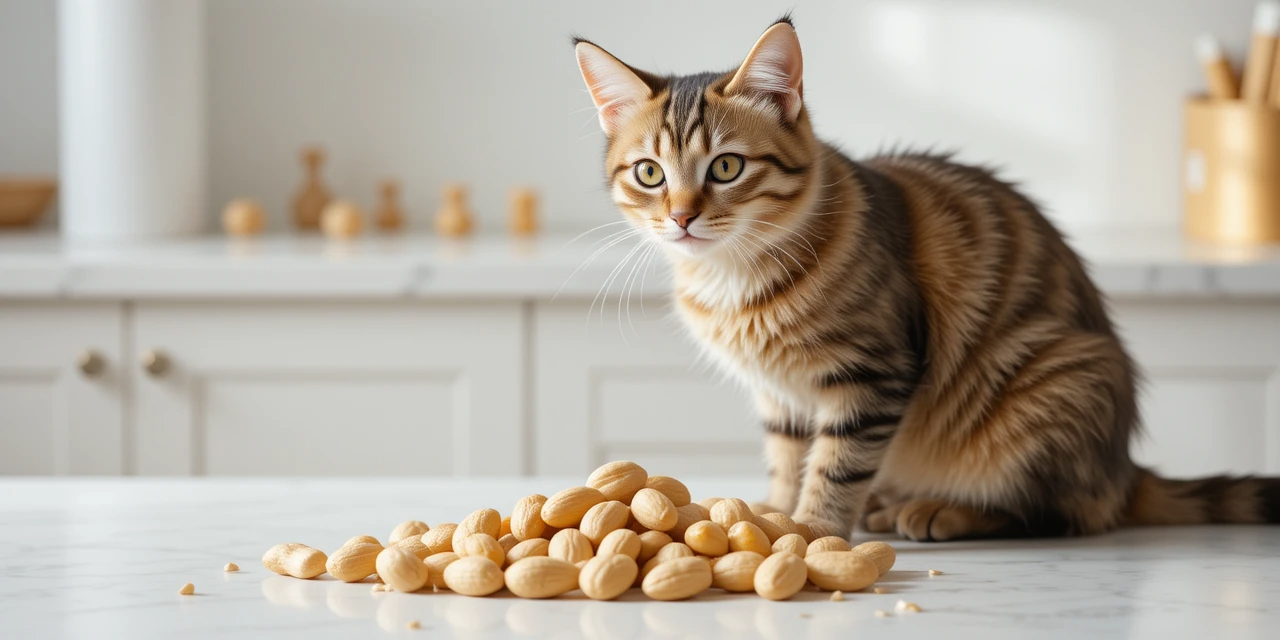Can Cats Eat Peanuts? The Surprising Truth Every Cat Owner Should Know
If you’ve ever dropped a peanut on the floor and seen your cat pounce on it, you may have wondered: Can cats eat peanuts? While peanuts are a popular snack for humans, it’s important to remember that cats have very different dietary needs. What’s healthy for us isn’t always safe for our feline companions.
In this article, we’ll break down everything cat owners need to know about peanuts—from safety and risks to smarter treat alternatives—so you can make the best decisions for your cat’s health.
Understanding Feline Nutrition
Cats are obligate carnivores, meaning their bodies are built to thrive on animal protein. They require nutrients like taurine, arachidonic acid, and vitamin A—nutrients that are naturally found in meat, not plants.
Peanuts, although rich in protein and healthy fats for humans, are plant-based and not a natural part of a cat’s diet. They don’t provide the essential nutrients your cat needs to stay healthy and can lead to nutritional imbalances if consumed regularly.
Are Peanuts Safe for Cats?
In short: plain, unsalted peanuts are not toxic to cats, but they aren’t recommended either.
Cats may nibble on a peanut out of curiosity, and if it’s an occasional, small, plain peanut, it’s unlikely to cause harm. However, they offer no real nutritional benefit and are not a suitable or necessary part of a cat’s diet.
Potential Risks of Feeding Peanuts to Cats
1. Choking Hazard
Peanuts, especially whole or shelled, pose a significant choking risk—particularly for kittens and older cats.
2. Digestive Issues
Peanuts are high in fat, which can be difficult for cats to digest. This may lead to vomiting, diarrhea, or an upset stomach.
3. Allergic Reactions
While rare, some cats may be allergic to peanuts, resulting in symptoms like itching, swelling, sneezing, or gastrointestinal distress.
4. Salt Toxicity
Many peanuts sold as snacks are salted or flavored. Excess sodium can lead to salt poisoning, causing symptoms such as dehydration, tremors, or even seizures.
5. Obesity and Related Health Problems
Peanuts are high in calories and fat, which can contribute to weight gain and long-term health issues like diabetes or joint problems.
Peanut Butter and Cats
Some pet owners are tempted to offer a lick of peanut butter to their cats. However, this can be even more dangerous than plain peanuts.
- Xylitol, a sugar substitute found in many peanut butter brands, is toxic to pets, including cats.
- Even xylitol-free peanut butter often contains added sugars, oils, and salt that are unhealthy for cats.
Bottom line? Avoid giving your cat peanut butter altogether.
Healthier Treat Alternatives
Instead of peanuts, try offering your cat these safe and satisfying treats:
- 🐔 Cooked chicken or turkey (no seasoning)
- 🐟 Plain canned tuna or salmon (in moderation)
- 🥩 Freeze-dried meat treats made for cats
- 🧀 Small amounts of cheese, if your cat tolerates dairy
When choosing treats:
- Make sure they’re low in salt and sugar
- Check the ingredients for additives or preservatives
- Look for options labeled “formulated for cats”
What to Do If Your Cat Eats Peanuts
If your cat happens to eat a peanut, don’t panic. Monitor them for the next 24–48 hours for any signs of:
- Vomiting or diarrhea
- Lethargy or loss of appetite
- Coughing or choking
- Swelling or itching
If your cat shows any unusual symptoms, contact your veterinarian right away.
Conclusion
While plain peanuts aren’t toxic to cats, they don’t belong in a feline diet. The potential risks far outweigh any minimal nutritional value. Stick to treats that are made with cats in mind to keep your pet happy, healthy, and safe.
FAQs
Can cats eat peanut shells?
No. Peanut shells are tough, fibrous, and indigestible, posing a serious choking hazard and potentially causing digestive blockages.
Are any nuts safe for cats?
Most nuts—including almonds, macadamias, and walnuts—are not recommended for cats. Many are high in fat, and some can be toxic.
What should I do if my cat shows signs of an allergic reaction?
If your cat is sneezing, scratching, or vomiting after eating peanuts, call your vet immediately. Allergic reactions can escalate quickly and should be treated as an emergency.


